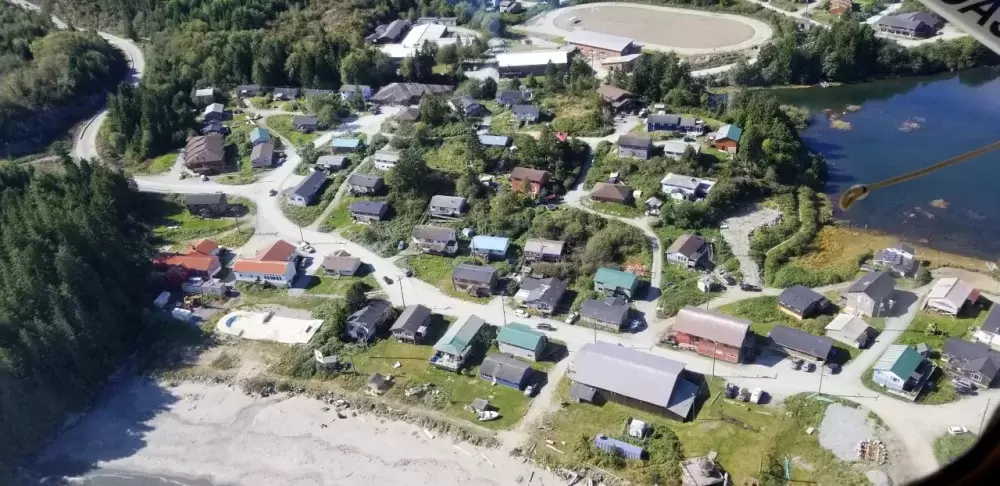The next round of road paving has begun in Ahousaht, with work in the Happy Hill neighbourhood near the schools that started in early November.
A crew from Nanaimo-based Hazelwood Construction is preparing 420 metres of road in the Flores Island community, plus 60 metres in a residential cul de sac. Laying gravel, grading, ditch digging and the construction of driveway culverts is expected to be complete by the end of the year.
“Right now there’s not really any ditching, so people just pull into their lot, but because we’re adding ditches we have to put in a culvert,” explained Paul Noel, general manager for Hazelwood Construction.
After the cold and damp weather passes in March or April Hazelwood then plans to pave the prepared surface with asphalt.
Beside its new subdivision at the south end of the community and the route leading to this neighbourhood, most of Ahousaht’s road are unpaved. But the First Nation plans to change this in the coming years, a combined effort estimated to cost $9 million. The Happy Hill phase of the paving is being done with $1.1 million made available by the federal government, which Ahousaht has used to hire Hazelwood and Associated Engineering.
“Since this is only $1.1 million, Ahousaht is going to continue to advocate for more dollars with the federal government to continue to pave our whole community,” said Chief Councillor Greg Louie.
The Hazelwood crews are currently working 10 days at a time in Ahousaht, with four days off.
“We have hired some locals too,” said Noel. “One of the equipment operators, Clarence Smith, he’s been consistent. We’ve also hired a few other fellows for labouring duties.”
Hazelwood has been doing jobs in Ahousaht for several years, and is also currently constructing a wastewater treatment plant in the community. Other work includes the construction and installation of the 1,210-metre water main line from Anderson Creek that was completed in January, and building a transfer station for household waste that gets transported to a dump in Tofino. In 2011 Hazelwood began work on 60 lots for the Maaqtusiis subdivision, including underground infrastructure, a sewage pump station and road paving.
“Our guys really enjoy working there,” said Noel. “They like the people, they like the community aspect and we never hear complaints from our guys about going there and working there.”
While working in Ahousaht the construction company doesn’t have to worry about the traffic control issues of a city, but other challenges arise in taking on a project in the remote community. Equipment and supplies need to be barged from Tofino, which can cost a much as $4,000 a trip. In the spring the asphalt will require a barge from Port Alberni, due to the transportation challenges of the winding route on Highway 4.
“The paving is complicated because they have to barge the hot asphalt,” noted Noel. “If the weather turns, there’s a risk component.”
Fortunately, a fuel station is available in Ahousaht, but like other contracts in remote communities, up to a 50 per cent labour cost increase is expected due to travel and accommodation.
“Beyond that, once you’re there, it’s similar to any other project,” said Noel.
As paving spreads through the community’s roads, the First Nation expects to see more vehicles. This will require stronger enforcement, commented Louie. This issue was brought up at Ahousaht’s annual general meeting in September, when members voiced concerns over drunk drivers, pedestrian safety and RCMP response. Suggestions included bylaws that set licencing and age limits for drivers on the reserve.
“Our community’s planning around road safety as we go forward,” said Louie. “Our deputy chief has put a call out for a working group to work around road safety.”







